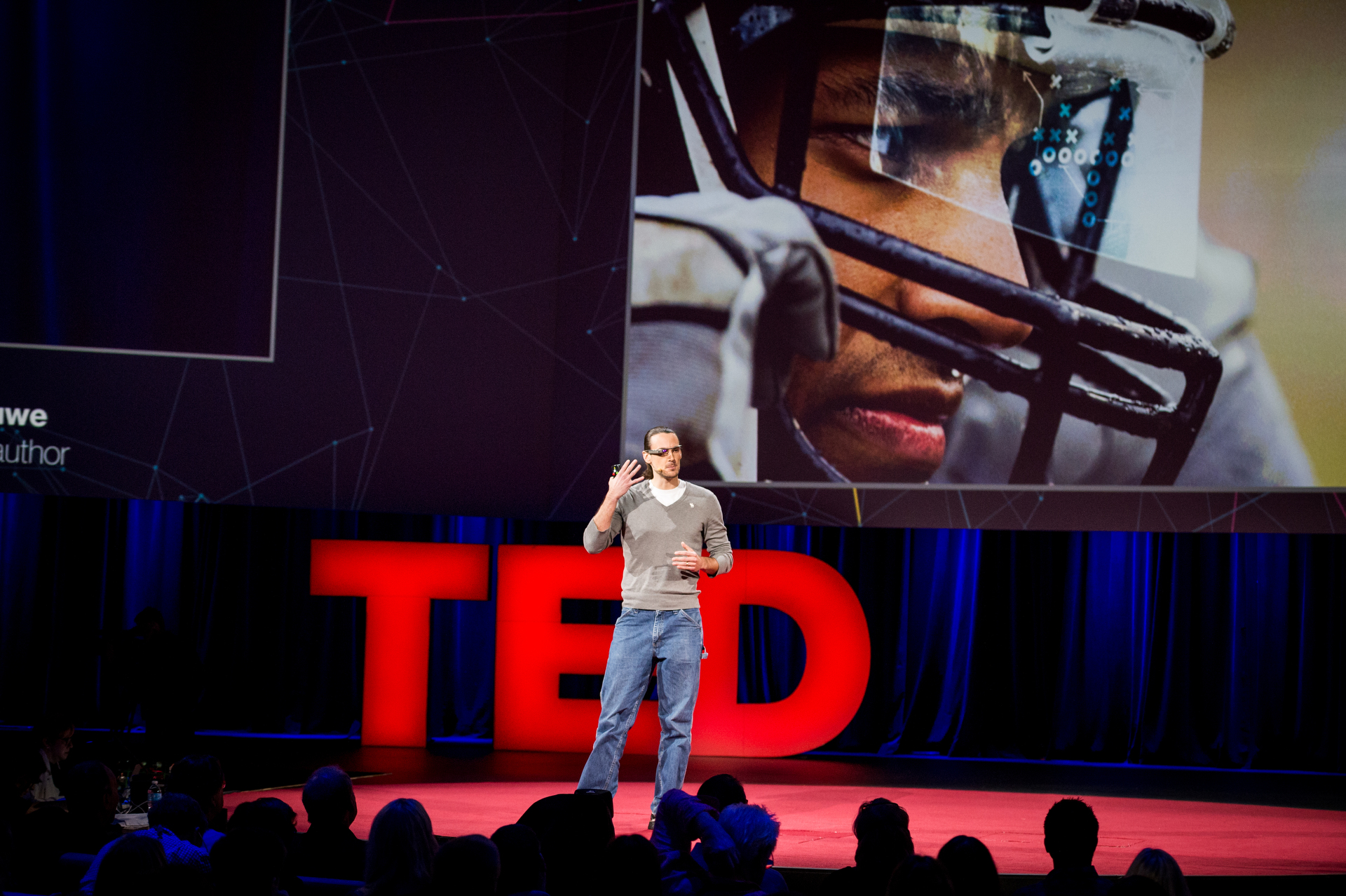What does augmented reality—and football—have to do with empathy?
A lot, says Chris Kluwe, former NFL punter and author of the book Beautifully Unique Sparkle Ponies. “Augmented reality is not science fiction,” he says.”Augmented reality will happen in our lifetime. And it will change our lives as much as the Internet.”
Kluwe is wearing the first step toward augmented reality, Google Glass. “It’s a device that will allow someone to see what I see,” he says. “It will let someone experience what it feels like to be a professional athlete on the field. With Google Glass, Ican put it underneath a helmet and you get a sense of what it is like to be running down a field at 100 mph and what it’s like to have a 250 pound man sprinting toward you trying to decapitate you.”
Kluwe wore Glass for a practice session with his brother, and in a video clip, we see him get tackled and fall, sky and grass tumbling over each other in a swirl. (“Getting tackled sucks,” he laughs.)
“Fans want that experience,” says Kluwe. “They want to feel what it’s like to be their favorite player.” He imagines that this experience could be even more intense using Oculus Rift, maybe the most realistic virtual-reality experience available now. He shows the classic video of someone freaking out on a roller coaster via Oculus Rift.
“Imagine what his experience will be when he’s Federer serving in Wimbeldon, when he’s going down a mountain at 70 mph as an Olympic skiier,” says Kluwe. “I think adult diaper sales might surge.”
But this is just virtual reality. How do we get to augmented reality? Kluwe thinks that the jump will be inevitable just as soon as coaches, managers and owners start to understand how it could help them improve their game and win more. These are the folks with the budgets and resources to push technology forward. Football fans want games to be fast and interesting, and coaches chase innovations that speed up the game. In 1965, the Baltimore Colts strapped a card to their quarterback’s arm to help him call plays faster — and the game suddenly got more fun to watch. It’s about to happen again. “Imagine you’re a player going back to the huddle, and you see the next play displayed in front of your face on the clear plastic visor that are already wearing right now,” says Kluwe.
Kluwe argues that augmented reality isn’t just a gimmick for fans or an “enhanced playbook,” but that it could be used to actually improve play. With cameras around a stadium and helmet sensors, a tremendous amount of data could be generated to help a player improve, and give them information in the moment to make fast decisions. Kluwe imagines a helmet that flashes lights to show the direction of a blitz coming in and throws a glowing aura around an open receiver. If the quarterback is hit during the throw, this helmet could alert the receiver and help them track the new trajectory of the ball. Touchdown!
“Now, your IT department is just as important as your scouting department, and data mining is not just for nerds, it’s also for jocks,” says Kluwe. “Augmented reality will be a part of sports because it’s too profitable not to be.”
But Kluwe thinks this is just a first step—and that augmented reality could have the power to change the entire human experience.
“We can use augmented reality as a way to foster more empathy within the human species itself. It shows what it looks like to literally walk a mile in someone else’s shoes,” says Kluwe. “Imagine what this technology would be worth to a teacher in a classroom trying to show a bully how harmful their actions are from the perspective of a victim? Or a Russian trying to show the world what it’s like to experience oppression? Or to Commander Hadfield or Neil Degrasse Tyson trying to inspire generation of children to think about space and science?”
Kluwe predicts that augmented reality will become a part of everyday society. “Do we just use this as entertainment or do we do something more?”

Comments (9)
Pingback: Faster football, greater empathy — it’s time for AR – Chris Kluwe at TED2014 | Empathy Reality
Pingback: The Future As History « Utopia or Dystopia
Pingback: Google Should Have Bought Oculus VR - eCoustics.com
Pingback: Chris Kluwe Wants to See Wearable Technology in American Football ‹ ARNext.comARNext.com
Pingback: Future of Technology | N — allround & all around
Pingback: Amanda Palmer’s Ninja TED Party: Completely Worth 3 Hours in a Line — Vancouver Is Awesome
Pingback: Yes, that’s Commander Chris Hadfield wearing the Oculus Rift. (And yes, the Internet just exploded.) | jr
Pingback: Yes, that’s Commander Chris Hadfield wearing the Oculus Rift. (And yes, the Internet just exploded.) | BizBox B2B Social Site